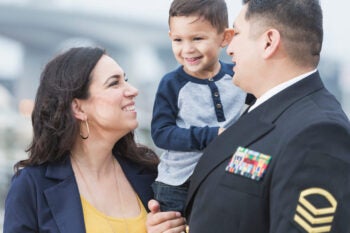Home /
Reintegration Doesn’t Always Heal: Teens Navigating Life After a Parent Returns Changed

The Myth of the “Happy Homecoming”
Media often romanticizes homecomings: hugs, tears, banners, and joyful reunions. But for many adolescents in military families, this moment marks a shift in the emotional climate at home. The parent who left may no longer act like the one they remember. According to the National Child Traumatic Stress Network (NCTSN), children and teens may struggle to adapt when a returning parent displays symptoms of PTSD, depression, or anxiety. These mental health challenges disrupt family routines, communication, and emotional safety (NCTSN, 2020).
When the Parent Becomes a Stranger
Military teens often report feelings of confusion, resentment, and fear when a parent comes home emotionally unrecognizable. Changes in temperament, sleep, and social engagement can be hard to understand—especially if the parent has difficulty expressing or even recognizing their own trauma. In a study conducted by Gewirtz et al. (2011), adolescents exposed to parental PTSD symptoms were significantly more likely to report internalizing behaviors like anxiety and depression, as well as externalizing behaviors like anger and defiance.
These changes can damage the parent-child bond, leading teens to feel emotionally abandoned even though the parent is physically present.
Teen Trauma Is Often Overlooked
Military teens often suppress their own emotions to “stay strong” for the family or avoid adding stress. This silent burden can lead to complex trauma—the result of prolonged exposure to emotional disruption without a clear or consistent source of safety. Research shows that teens in military families are at higher risk for emotional distress, particularly when family functioning is low during reintegration (Lester et al., 2016).
Common Reactions in Teens During Reintegration:
- Withdrawal from family or peers
- Sleep disturbances or nightmares
- Risk-taking behavior (substance use, sexual activity, self-harm)
- Academic decline
- Feelings of guilt or responsibility for family tension
Supporting Military Teens Through Reintegration
Reintegration is not a singular event—it’s a process. For military teens, healing starts with recognition, connection, and validation. Mental health providers, caregivers, and military support systems must create safe environments for teens to express their feelings without judgment or pressure to “be strong.”
Therapeutic strategies that help:
- Trauma-Informed CBT: Helps teens process changes, develop emotional regulation, and challenge self-blame
- Family Therapy: Supports communication, improves emotional safety, and fosters reconnection
- Peer Support Groups: Reduces isolation by connecting teens with others experiencing similar challenges
- Psychoeducation: Helps teens understand PTSD and reintegration in age-appropriate ways
Moving Forward: Normalizing the Uncomfortable
Reintegration should not be portrayed as the finish line, but rather as the next phase of the journey. Parents may need time and support to heal—and so do their children. By acknowledging the emotional realities that teens face during this period, we move closer to giving them the support they need to thrive—not just survive—in military life.
References
- Gewirtz, A. H., Polusny, M. A., DeGarmo, D. S., Khaylis, A., & Erbes, C. R. (2011). Posttraumatic stress symptoms among National Guard soldiers deployed to Iraq: Associations with parenting behaviors and couple adjustment. *Journal of Consulting and Clinical Psychology, 78*(5), 599–610. https://doi.org/10.1037/a0020571
- Lester, P., Liang, L., Milburn, N., Mogil, C., Woodward, K., Nash, W., … & Beardslee, W. (2016). Evaluation of a family-centered prevention intervention for military children and families facing wartime deployments. *American Journal of Public Health, 106*(1), 10–15. https://doi.org/10.2105/AJPH.2015.302875
- National Child Traumatic Stress Network (NCTSN). (2020). Military children and families: Supporting youth during reintegration. Retrieved from https://www.nctsn.org/resources/military-children-and-families-supporting-youth-during-reintegration


